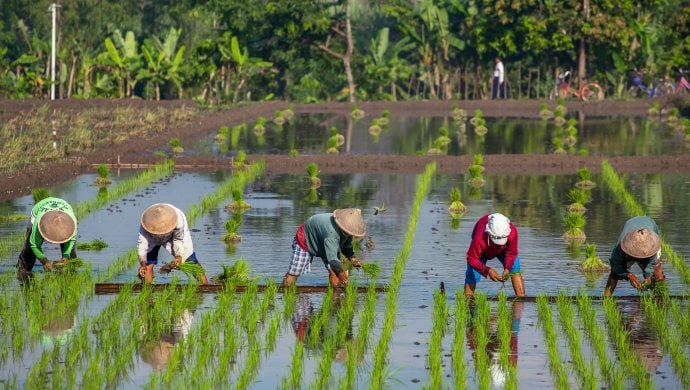Whether it’s helping Indonesian farmers, finding jobs for people in poor countries or helping companies donate, these companies are making a difference

Marketplaces are often regarded solely as a business opportunity, but the fact that they can improve processes and drive efficiency means that it can be used for a whole lot of good.
From charity auctions, fundraising through goods and services, to helping the world give aid to those in need, online marketplaces are proving as a great tool towards making the world a better place.
Global nonprofit organisation Business for Social Responsibility recently published a report on opportunities to build a more inclusive sharing economy.
The report says,
“By removing or reducing barriers such as ownership costs and complex, inflexible distribution networks, sharing economy models have incredible potential to enable much greater access to crucial goods and services for people and communities who have often been excluded from or are unable to meet their needs through more traditional models”.
Sharing economy giants have realised this too. Uber has made efforts to reach out to the underprivileged through partnerships with local counties and cities to subsidise rides to and from transit stops, or rides in “transit disadvantaged” areas.
Airbnb also directly offers services to disadvantaged groups — it works with nonprofits to support people who need temporary housing, be it medical patients traveling for treatment, or low-income students visiting colleges. They prove that lower-income consumers, who are often marginalised by traditional economic models, can benefit from the sharing economy too.
The benefits of marketplaces for noble social causes are amplified, as online marketplaces gives those causes an even greater reach, and such platforms have become easy and much less costly to set up in today’s day in age. Let’s see how marketplaces around the world are being used to lift the impoverished out of poverty and to elevate their quality of life.
Tanihub
Indonesia’s food system is known to be plagued with issues of inefficiency and inflation. The Indonesian Statistics Agency reports indicate that supply chains can reach up to eight or nine echelons, driving prices higher.
To combat this, Tanihub was created to help stabilise agricultural commodity prices by cutting off long supply chains and improving price transparency, according to CEO Michael Jovan Sugianto.
Other than making it easier for farmers to market their products directly to consumers, Tanihub’s mission is to improve farmers’ welfare and to work towards a self-sufficient Indonesia.
It also offers farmers free training on how to use the app to sell their produce, as well as funding opportunities for producers who have worked actively with Tanihub for a minimum of 6 months.
Samasource
Serving the unemployed in Haiti, India, Kenya, Uganda, and the United States, Samasource is a recruitment marketplace with a mission to reduce global poverty.
Samasource CEO Leila C. Janah founded the non-profit social enterprise in 2008 — one of the first marketplaces for socially responsible outsourcing. It connects large tech companies with small and medium outsourcing firms in impoverished areas that lack training and access to clients.
“’Give a man a fish and you have fed him for a day. Teach a man to fish and you feed him for a lifetime.’ Samasource is teaching men to fish. The most powerful way to alleviate poverty is to give work, not aid,” says Janah.
Samasource offers digital services for complex data projects, including content moderation, digital transcription, and machine learning to clients, among them Google, Ebay, Walmart, Intuit, LinkedIn, and Microsoft. Samasource workers, who were previously earning below a local living wage, are trained in basic computer skills and paid a fair wage.
As of August 2016, Samasource has improved the lives of 7,896 workers and 24,399 dependents.
Good360
Good360 is a nonprofit organization that helps companies donate excess merchandise to its network of 40,000 nonprofit organizations from all over the world.
Considered one of the 50 largest U.S. charities by Forbes, nonprofits can choose the products they want on their marketplace called GivingPlace360, while individuals can help cover shipping and handling costs through its crowdfunding platform.
Good360 has also launched Disaster Recovery 360 to help communities impacted by disasters. Their platform enables nonprofits responding at the site of a disaster to collect real-time product needs, provide timely updates, and share stories of how donations have impacted the community and helped them throughout the recovery process.
Also Read: E-shopping platform for Muslim women Good Hijab aims to help underprivileged youth in Malaysia
These marketplaces propagate the idea that success should be measured not only by financial accomplishments, but in terms of social responsibility achievements.
Everyone can make a difference — it is up to you to decide how.
—
Clarissa Santoso is a Marketing Communications Specialist at Arcadier, a SaaS company that powers next generation marketplace ideas. You can follow Arcadier on Twitter, Facebook, and LinkedIn for the latest insights on the sharing economy.
Photo courtesy of 123rf.com.
The post Tech for good: Marketplaces as a tool to make the world a better place appeared first on e27.